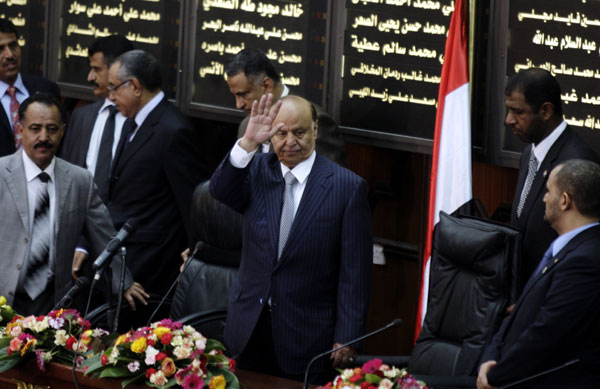
SANAA, Yemen - A car bomb outside the gate of a presidential compound in southern Yemen killed at least 25 people hours after the country's new president was inaugurated and vowed to fight al-Qaida.
A security official said the attack in the city of Mukalla in Hadramout province was carried out by a suicide bomber, and that it bore the hallmarks of an al-Qaida operation. Both al-Qaida and southern separatists are active in the region.
 |
|
Yemen's newly elected President Abed Rabbo Mansour Hadi waves as he arrives at the parliament in Sanaa, Yemen, on Saturday. Hadi took the oath of office before the country's parliament on Saturday. Hani Mohammed / AP Photo |
A health official confirmed the death toll. Both officials spoke on condition of anonymity as they were not allowed to speak to the press.
The blast came hours after Abed Rabbo Mansour Hadi was sworn in as president to replace Ali Abdullah Saleh, following an election aimed at ending more than a year of political turmoil in Yemen. Hadi was the only candidate in the election.
In his televised speech before parliament, Hadi vowed to keep up Yemen's fight against al-Qaida-linked militants, who have taken advantage of the country's political turmoil to seize control of towns and swaths of territory in the restive south.
Hours after Hadi spoke, the car bomb rocked Mukalla in the province of Hadramout, part of formerly independent south Yemen, which united with the north in 1990.
Ahmed al-Rammah, who witnessed the blast, said by phone from Mukalla that he saw a pickup moving slowly to the gate as soldiers were coming out. Then it exploded, he said. The explosion was followed by heavy gunfire from the surviving guards.
Hadramout's governor, Khaled Said el-Deeny, said that police have launched an investigation.
Southern Yemen has been wracked by violence in the wake of anti-Saleh protests over the past year. Many accuse the longtime ruler of allowing security to collapse as a way of pressuring Western governments and neighboring Gulf countries into keeping him in power.
Yemen's new president takes power with a popular mandate bolstered by the unexpectedly large turnout 65 percent for the Tuesday vote.
But Hadi faces a slew of challenges as he tries to bring stability to the country. He must restructure powerful security forces packed with Saleh loyalists, launch a national dialogue that would include southern secessionists, and appease a restless religious minority in the north as well as disparate opposition groups in the heartland.
Saleh meanwhile returned to Yemen early on Saturday after spending about three weeks in the US receiving treatment for injuries he suffered during a June explosion at his compound that helped hasten his departure. Upon his arrival, Saleh told said that the election was "part of a peaceful exchange of power", and that it marked the start of "a new page" in Yemen.
Saleh is the fourth Arab leader swept from power by the "Arab Spring". But thanks to his continued presence in the country and his negotiated exit, the political changes brought by his ouster may be much less dramatic than the results of uprisings in Tunisia, Egypt and Libya.
Many fear that the ex-president, who has cast a large web of tribal and family relations during his more than three decades of rule, may still try to pull the strings during the transitional period until a new constitution is written.
Hadi called on all political parties to abide by democracy as a means to move Yemen out of its crisis.
"Expected changes don't come by mere wishes and hopes but through democratic dialogue, and through a serious and correct approach to the key issues that racked the country," he said.
Associated Press